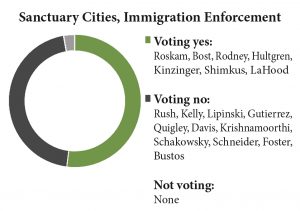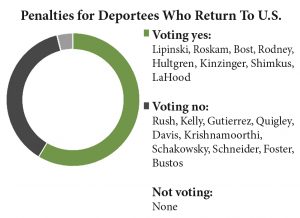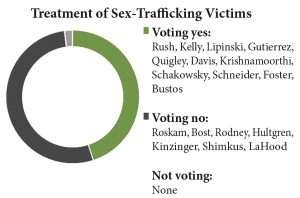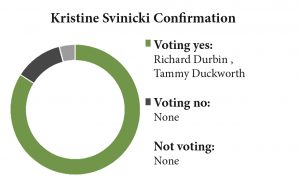How They Voted. Illinois Representatives’ Votes in Congress
Chronicle Media — July 1, 2017Report for week ending June 30, 2017.
UNITED STATES HOUSE OF REPRESENTATIVES
 Sanctuary Cities, Immigration Enforcement: Voting 228 for and 195 against, the House on June 29 passed a GOP-sponsored bill (HR 3003) that would deny law-enforcement and anti-terrorism grants to so-called “sanctuary cities” that refuse to cooperate with federal immigration enforcement. Critics say these cities are legally required to comply with federal requests that they help locate and detain undocumented immigrants. In response, the cities say that to do so would undercut local policing efforts that depend on rapport with immigrant populations. There are more than 400 sanctuary cities nationwide.
Sanctuary Cities, Immigration Enforcement: Voting 228 for and 195 against, the House on June 29 passed a GOP-sponsored bill (HR 3003) that would deny law-enforcement and anti-terrorism grants to so-called “sanctuary cities” that refuse to cooperate with federal immigration enforcement. Critics say these cities are legally required to comply with federal requests that they help locate and detain undocumented immigrants. In response, the cities say that to do so would undercut local policing efforts that depend on rapport with immigrant populations. There are more than 400 sanctuary cities nationwide.
Steve Chabot, R-Ohio, said the bill would “strengthen our nation’s immigration laws, hold sanctuary cities accountable and enhance public safety by requiring detention of criminal aliens.”
Zoe Lofgren, D-Calif., said the bill “is about telling communities how to police themselves and protect their people. It says: We here in D.C. know better than you do, local police, across the United States.
A yes vote was to send the bill to the Senate.
Exemption to Protect Public Safety: Voting 181 for and 230 against, the House on June 29 defeated a Democratic bid to exempt from HR 3003 (above) any sanctuary city where local authorities conclude that federal immigration mandates and financial penalties would impede their investigation of crimes including sexual assault and domestic violence and thereby undermine public safety.
Val Demings, D-Fla., said “law enforcement officers investigate and interview witnesses. Their goal is to solve crimes, regardless of the immigration status of victims and witnesses” and “eliminating federal grant-funding for political reasons impedes their ability to solve crimes.”
Bob Goodlatte, R-Va., said sanctuary-city policies and practices “hamper the enforcement of federal law and do nothing to truly promote trust between law enforcement and U.S. citizens.”
A yes vote was to adopt the motion.
 Penalties for Deportees Who Return to U.S.: Voting 257 for and 167 against, the House on June 29 passed a bill (HR 3004) that would toughen sentences on undocumented immigrants, including ones with criminal records, who are convicted of illegally re-entering or attempting to re-enter the U.S. after they have been deported. Republicans named the bill Kate’s Law in response to a 2015 murder in San Francisco, a sanctuary city, in which an illegal immigrant with felony convictions murdered Kathryn Steinle after city authorities released him from custody.
Penalties for Deportees Who Return to U.S.: Voting 257 for and 167 against, the House on June 29 passed a bill (HR 3004) that would toughen sentences on undocumented immigrants, including ones with criminal records, who are convicted of illegally re-entering or attempting to re-enter the U.S. after they have been deported. Republicans named the bill Kate’s Law in response to a 2015 murder in San Francisco, a sanctuary city, in which an illegal immigrant with felony convictions murdered Kathryn Steinle after city authorities released him from custody.
Lou Barletta, R-Pa., called the bill “a test of the willingness of Congress to stand for families across this country who have lost loved ones to crimes committed by criminals who had no business being in this country in the first place.”
Jerrold Nadler, D-N.Y., said: “Although most people who illegally re-enter the country do so to reunite with their families or to flee violence or persecution, this bill considers them all dangerous criminals who deserve lengthy prison sentences.”
A yes vote was to send the bill to the Senate.
 Treatment of Sex-Trafficking Victims: Voting 193 for 232 against, the House on June 29 defeated a Democratic bid to protect against criminal prosecution under HR 3004 (above) victims of sex trafficking who cross the U.S. border to seek protection at ports of entry. The exemption would apply to individuals who have been previously deported from or denied admission to the U.S.
Treatment of Sex-Trafficking Victims: Voting 193 for 232 against, the House on June 29 defeated a Democratic bid to protect against criminal prosecution under HR 3004 (above) victims of sex trafficking who cross the U.S. border to seek protection at ports of entry. The exemption would apply to individuals who have been previously deported from or denied admission to the U.S.
Zoe Lofgren, D-Calif., said: “These are not individuals attempting to evade immigration agents. They are not trying to sneak into the United States. They are simply exercising the right to lawfully approach a U.S. port of entry to seek permission to enter.”
Bob Goodlatte, R-Va., said that under existing law, “an alien who has been deported and who returns to the U.S. is subject to possible criminal prosecution.”
A yes vote backed an exemption for sex-trafficking victims.
Medical-Malpractice Lawsuits: Voting 218 for and 210 against, the House on June 28 passed a GOP-sponsored bill (HR 1215) to limit medical-malpractice lawsuits in federal and state courts. In part, the bill would cap non-economic (punitive) damages at $250,000, limits plaintiffs’ lawyers’ contingency fees and narrow the window for filing suits. The bill places no caps on economic damages and does not pre-empt state laws that impose higher or lower medical-malpractice caps.
Ken Buck, R-Colo., said: “Trial lawyers too often stand between patients and their doctors. With the looming threat of excessive, unending lawsuits, healthcare providers have to worry more about the trial lawyer at their door than the patient in their office. (The bill) places important limits on these lawsuits so that the truly wronged are compensated without enriching trial lawyers at the same time.”
Jan Schakowsky, D-Ill., said: “Nearly half a million Americans die every year from preventable medical errors, and many more are permanently injured. This bill does nothing to solve that problem. Instead, it just takes away the right of the injured consumers. And if you believe that average Americans should not be barred from the justice system as they seek to hold wrongdoers accountable, then you must oppose this bill.”
A yes vote was to send the bill to the Senate.
Malpractice with Painkiller Prescriptions: Voting 191 for and 235 against, the House on June 28 defeated a Democratic motion to exempt from HR 1215 (above) legal actions alleging gross negligence in prescribing the highly addictive pain medications known as opioids. U.S. doctors write hundreds of thousands of opioid prescriptions each day, and critics say over-prescription is driving a nationwide drug epidemic centered in rural areas in which opioid abuse spreads to heroin addiction and mortality.
Ann Kuster, D-N.H., said the exemption was imperative because “in rural communities and elsewhere, pill mills churn out opioid prescriptions with no regard for the well-being of their patients.”
Matt Gaetz, R-Fla. said the motion was unneeded because the bill already exempts criminal conduct from malpractice limits.
A yes vote was to adopt a motion concerning opioid prescriptions.
UNITED STATES SENATE
 Kristine Svinicki Confirmation: Voting 88 for and nine against, the Senate on June 26 confirmed Kristine L. Svinicki to her second five-year term on the Nuclear Regulatory Commission, where she is expected to continue to serve as chairwoman. Svinicki, 51, a nuclear engineer, held previous positions at the U.S. Department of Energy and on the Senate Armed Services Committee. The NRC is charged with overseeing the licensing and operation of nuclear power plants in the U.S. and other areas of public health and safety related to nuclear energy.
Kristine Svinicki Confirmation: Voting 88 for and nine against, the Senate on June 26 confirmed Kristine L. Svinicki to her second five-year term on the Nuclear Regulatory Commission, where she is expected to continue to serve as chairwoman. Svinicki, 51, a nuclear engineer, held previous positions at the U.S. Department of Energy and on the Senate Armed Services Committee. The NRC is charged with overseeing the licensing and operation of nuclear power plants in the U.S. and other areas of public health and safety related to nuclear energy.







